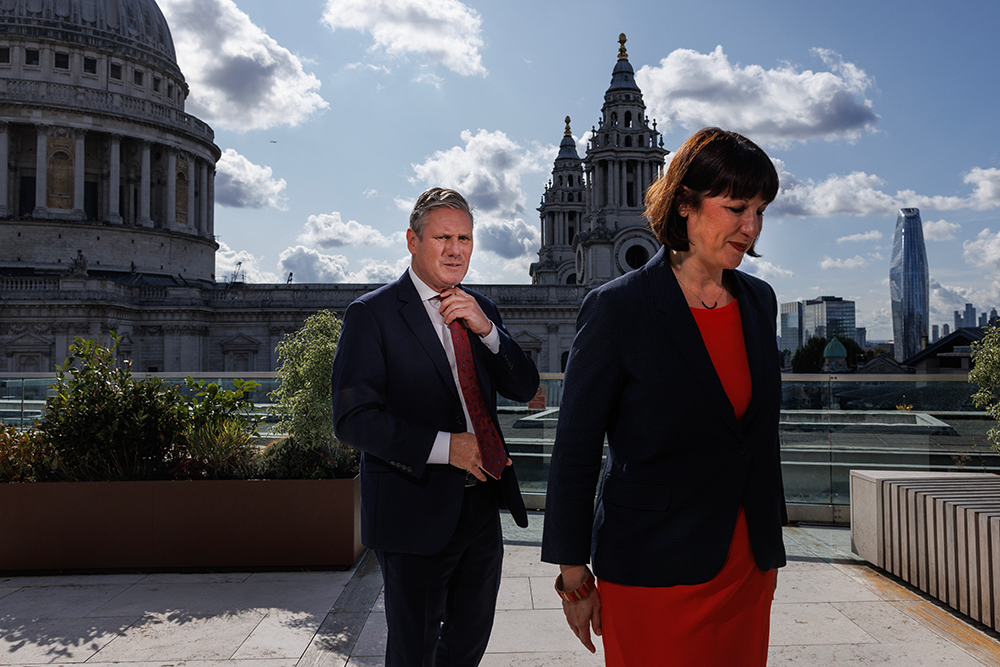This Saturday marks Labour’s 100th day in office. But they are unlikely to be popping champagne corks in Downing Street – even if Lord Alli offered to pay for the Dom Pérignon. This has been a disheartening time for the government and those who wished it well. The promise of dramatic change has been overshadowed by a series of errors, misjudgments and scandals that one would associate more with an administration in its dying days than a government enjoying a fresh mandate, a massive majority and an absent opposition.
Ministers might fondly hope voters will have been encouraged by the introduction of legislation to help renters, the abolition of one-word Ofsted judgments or the establishment of Great British Energy. But these achievements, if one can call them that, have been eclipsed by the Great British Farce of cabinet ministers’ birthday parties paid for by millionaires, spousal wardrobes stuffed by donors and access to Downing Street secured at the drop of an optician’s bill.
The voters who gave Labour victory were those who backed Brexit and Boris
If the government had proved sure–footed and accomplished in its other dealings, such undignified transactions might not have excited much scorn. But an early decision to remove winter fuel payments from all save a minority of pensioners while handing handsome pay rises to already well-remunerated train drivers – compounded by confusion over plans for VAT on private school fees and consternation at the idea of banning smoking in pub gardens – have all contributed to the sense of a government at once heartless, maladroit and missing the big picture.
William Hague once observed that New Labour would inspire first fascination, then admiration, then disillusionment and finally contempt. He was right. But what Tony Blair and Gordon Brown achieved after 13 years, Keir Starmer has accomplished in a mere three months. Opinion polls now indicate that voters already prefer, by a small margin, the last Conservative government to this Labour one. Given the precision-targeted and uniformly violent force with which that last government was ejected from office, that is not a happy portent.
That polling confirms the one enduring truth about contemporary politics – its volatility. Across the developed world the past decade and a half has seen convulsive change in political systems and fortunes. Traditional loyalties have been eroded. The old class basis of parties such as the SPD in Germany or Les Républicains in France has fractured. In America, a president who left office roundly accused of trying to subvert the last election now stands at least an evens chance of winning the next one.
So Labour’s current troubles need not mean certain failure. The Prime Minister, whatever his other characteristics, has shown that he can learn from mistakes, act ruthlessly and focus relentlessly. At his party’s lowest ebb in opposition, after losing the once safe Labour seat of Hartlepool to Boris Johnson in a by-election, he contemplated resignation. But he resolved to be a fighter not a quitter. He reshuffled his team, demoting some of those most loyal to him, such as the then shadow home secretary Nick Thomas-Symonds, and aides who had been with him from the beginning. He tacked to the centre, having promoted Rachel Reeves to shadow chancellor and entrusted electoral strategy to the County Cork street-fighter Morgan McSweeney. He was helped by the Conservative party reverting to its traditional recreation of forming circular firing squads, only this time equipped with semi-automatic weaponry. Nevertheless, Starmer maintained that grip on his party and discipline over policy, which secured a landslide.
It is to Rachel Reeves and McSweeney that he has now chosen to turn again to recover his fortunes. Naturally, attention has so far focused on the personnel changes the Prime Minister has made in No. 10 at McSweeney’s behest and on the invidious tax choices Reeves is contemplating. Both fascinate. But there is a much bigger challenge Reeves and McSweeney must meet.
There is still a gaping hole where the government’s vision of how all of Britain will grow and prosper should be. There is, as yet, no coherent and comprehensive political economy for the nation. There is no vision for reviving our overlooked and undervalued communities. The Tories’ levelling-up agenda has been abandoned. Nothing meaningful has appeared in its place.
That failure can be addressed in the Budget and beyond. But it requires hard choices. If high-quality jobs are to return to the North and the Midlands then re-industrialisation is presumably the answer. But how can that be reconciled with a decarbonisation strategy that raises prices for energy-hungry industries and has already spelled doom for the Port Talbot steelworks and Grangemouth oil refinery?
Relaxing rules on government capital spending may boost economic activity, but why have so many of the capital projects in left-behind areas been axed already? Proposals to deregulate land planning may also drive growth, but why lower ambitions for new housing in London, the area that needs it most? And what prospect is there of delivering major infrastructure projects, such as the Lower Thames Crossing, if decisions are pushed back and there is no progress on reforming the inherited EU laws which most inhibit new development?
The Chancellor has a capacious and inquisitive mind. McSweeney has a keen sense of how impatient Labour’s electoral coalition is to see change. Both know the voters who gave them victory this time were those who backed Brexit in 2016 and Boris in 2019. We shall see in the next 100 days if they are being properly listened to.







Comments